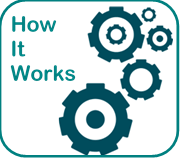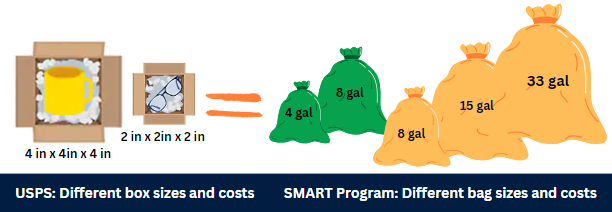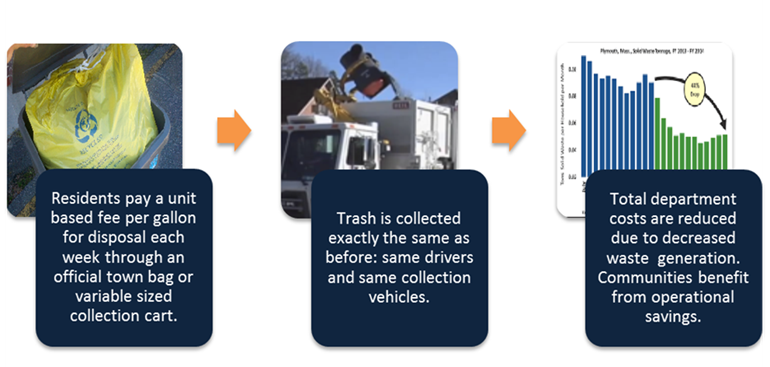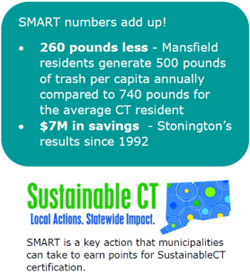Save Money and Reduce Trash (SMART) by Implementing Unit-Based Pricing (UBP)
In 2021, through the Sustainable Materials Management (SMM) Grant Program, the CT DEEP released grant funding and technical assistance for municipalities, regional Council of Governments (COGs), and regional waste authorities to initiate and scale up SMART/ UBP and food scrap collection efforts in Connecticut.
Fifteen municipalities and three regional entities received grants through the SMM Grant Program and are successfully demonstrating that Connecticut residents can and will participate in SMART/ UBP programs with food scrap diversion options to divert and reduce waste. To learn more about the SMM Grant Program contact DEEP.RecyclingProgram@ct.gov.
Table of Contents
Toolkit (SMART Resources for Municipalities)
Success Stories from Existing SMART Programs
SMART, also known as Unit-Based Pricing (UBP), or Pay-As-You-Throw (PAYT), or Save-As-You-Throw (SAYT), is a method of charging for trash disposal based on the amount disposed of. SMART is globally recognized as the single most effective action a municipality can take to reduce waste, increase recycling, and reduce climate impact.
SMART is a key cost savings strategy for municipalities to meet CT's 60% diversion goal by 2024. The State of Connecticut has long identified SMART as a key strategy for reducing waste, most recently in the State's Comprehensive Materials Management Strategy (2016) and previously in the Modernizing Recycling Working Group Recommendations (2012) and the State's Solid Waste Management Plan (original dated 1991, amended in 2006).


How it Works
SMART is a system in which residents pay for municipal solid waste (MSW) services per unit of waste discarded rather than solely through a fixed fee or property tax. When residents pay directly for waste disposal services, they are financially incentivized to reduce their waste through reuse or donations, waste reduction, recycling, food scraps diversion, or composting.
SMART programs work similarly to pre-paid flat-rate shipping system; service users pay not only for the box but also the shipping costs of the box’s contents. The cost of the program bags or carts includes the actual cost of the disposal of the materials being thrown away.

A variety of states (MA, ME, RI, VT) including CT, the U.S. Environmental Protection Agency (EPA), the Northeast Recycling Council (NERC), and the Northeast Waste Management Officials Association (NEWMOA) have evaluated SMART and agree that it is essential to achieving sustainable materials management at the state and municipal level.
A handful of Connecticut municipalities have joined the over 7,000 communities nationwide (EPA) that have successfully implemented SMART programs. This means that households in their towns are charged for waste collection based on the amount of waste they throw away - in the same way that they are charged for electricity, gas, and other utilities. This provides incentives for residents to not only increase the amount they recycle and donate but also to think about ways to generate less waste in the first place.

SMART programs are flexible and work in many types of communities at the curb or at the transfer station using variable sized bags or carts. The pricing of the bags or carts is structured so that residents are incentivized to choose a smaller size, thus reducing the amount of trash generated and increasing composting and recycling.
Implement SMART before other materials management programs. Residents are more likely to participate in curbside or drop-off food collection programs if they already actively manage their trash (ILSR, 2018). Education and outreach programs help increase awareness and participation levels but do not reduce waste at the magnitude of a SMART program.
Pay-As-You-Throw or SMART programs “reward all behaviors—recycling, composting, and source reduction—that reduce the amount of garbage thrown away. Source reduction is the cheapest waste management strategy and thus of the highest priority” (The Reason Foundation, 2002).
SMART is:
- Fiscally Responsible
- Environmentally Responsible
- Socially Responsible
SMART is Fiscally Responsible
 Transparency of solid waste management costs coupled with SMART economic signals (creating a connection between reducing costs and reducing trash) incentivizes households to produce less trash. Because residents immediately feel the pinch when they throw away trash, they pay attention. And through paying attention to what can be recycled in the blue bin, donated to a thrift store, or reused reduces waste and reduces what a resident spends on trash. This results in less tonnage hauled and tipped at the waste-to-energy facility.
Transparency of solid waste management costs coupled with SMART economic signals (creating a connection between reducing costs and reducing trash) incentivizes households to produce less trash. Because residents immediately feel the pinch when they throw away trash, they pay attention. And through paying attention to what can be recycled in the blue bin, donated to a thrift store, or reused reduces waste and reduces what a resident spends on trash. This results in less tonnage hauled and tipped at the waste-to-energy facility.
SMART results in big cost savings to cities and towns, and provides an important ability to control future costs of trash disposal. As an example, Stonington, CT has saved over $7M on avoided waste disposal costs since implementing SMART in 1992. By implementing SMART, and reducing trash management costs, municipalities have the opportunity to free up critical funds for use elsewhere in their budgets. SMART is a key cost savings strategy to help municipalities meet diversion goal of 60% by 2024 as outlined in the 2016 Comprehensive Materials Management Strategy.
SMART is Environmentally Responsible
SMART programs divert materials from CT’s waste-to-energy facilities and into the materials reuse and recycling streams. Reuse and recycling materials uses less energy and in turn generates less greenhouse gas emissions than burning or landfilling trash.
Statewide implementation of SMART would result in reducing greenhouse gases by the equivalent of installing one solar panel on every house in CT (Waste Zero and EPA GHG Equivalencies Calculator).
SMART is Socially Responsible
SMART is a more equitable approach to funding materials management. Most CT communities currently pay for trash disposal through their taxes or a flat fee. Those who generate less trash or recycle more should benefit from their positive actions. Instead, they pay for neighbors who have wasteful behaviors and may generate two or three times as much waste. With SMART programs, residents are rewarded by having a lower trash bill when they reduce their waste, increase donations and recycle right.
As SustainableCT cities and towns are learning, our communities are experiencing growing inequities in resources and access. Communities that live and work near waste-to-energy facilities are impacted greatly due to air pollution and reduced housing values, which reduces their opportunities and access to resources. SMART communities can substantially reduce the amount of materials sent to these facilities, reducing the need to build additional capacity. Additionally, SMART means better management of municipal budgets. “Money spent on incineration is money that cannot be spent on other municipal services with greater benefits for citizens with lower incomes” (Seldman, 2018).

Toolkit (SMART Resources for Municipalities)
- SMART Fact Sheet
- An Analysis of SMART for CT Municipalities (Waste Zero 2016-2018)
- CT DEEP Checklist for earning points through Sustainable CT, a statewide program run by the Institute for Sustainable Energy at Eastern Connecticut State University. Sustainable CT inspires and supports communities to become more efficient, resilient, and inclusive. Under Action 9.2 “Implement Unit-Based Pricing," municipalities can earn points for efforts to reduce residential trash generation.
- The Northeast Waste Management Officials Association (NEWMOA) provides case studies, outreach materials, workshop presentations and a SMART toolkit for rural communities.
- Massachusetts DEP has extensive resources available including data and program information for existing MA SMART programs, fact sheets, presentations, and case studies.
- MA DEP Pay-As-You-Throw: An Implementation Guide for Solid Waste Unit-Based Pricing Programs
- MA DEP SMART Bag Vendors on State Contract for bag administration and distribution services
- National League of Cities identifies PAYT (aka SMART) as top strategy to reduce municipal solid waste.
- Institute for Local Self Reliance analyzed data revealing that PAYT (aka SMART) is “the single most effective way to educate and motivate residents to reduce, reuse, recycle and compost” and is recognized as the vital first step to reaching zero waste.
- SMART Presentations: Presentations created by the Naugatuck Valley Council of Governments (NVCOG) and the South Central Regional Council of Governments (SCRCOG) for a two-part forum to inform municipal staff and elected officials on the implementation and successes of Organics Diversion & Unit Based Pricing (UBP)/SMART programs:

Success Stories from Existing SMART Programs
A growing number of communities across the country are using SMART programs. Case studies and recordings of testimonials from municipal officials on their SMART programs are available at the hyperlink below.
Case Studies
Drop-off Transfer Station Programs
- Mansfield, CT residents generate 500 pounds of trash per capita annually compared to the CT average, 740 pounds
Curbside Programs
- Seekonk, MA residents generate 437 pounds of trash per capita annually with a curbside PAYT/SMART bag in cart program
- Stonington, CT has saved $7M on trash since 1992
Recorded Testimonials (Videos)
- Concord, NH recycling rate increased 36% (up from 13% before the curbside PAYT/ SMART program)
- Middletown, RI the recycling rate increased from 18% to 42% after PAYT started
- Natick, MA the recycling rate increased dramatically from 23% the year before to 37% after PAYT started
- Needham, MA decreased its waste tonnage disposed by 41% from 1999 to 2000
- Portland, ME trash tonnage dropped 60% since the start of the PAYT (aka SMART) program
- Sanford, ME cut its municipal solid waste by 42% and nearly doubled its recycling rate in the first two months of the program
- Shrewsbury, MA, the amount of municipal solid waste generated has decreased since the start of the PAYT program.
- Southold, NY estimates that their PAYT program has saved the Town over $8M since 1993
Case Studies to Learn From
Transfer Stations Pricing Examples in Connecticut
There are about 30 programs at municipal transfer stations in CT, varying from stickers and punch cards to pay-per-bag. The following is not an inclusive listing, but can be used to compare program features and pricing for municipalities interested in implementing a program at their transfer station. When reviewing these programs, please keep in mind that a SMART program is most effective when (1) most of the households in a municipality participate in the program and (2) when the cost structure is designed to provide a real incentive to reduce the amount of trash disposed.If you have any questions or if you are interested in learning more about SMART/ UBP programs, please contact Jennifer Weymouth at 860-424-3508.
Content last updated May 1, 2025.


